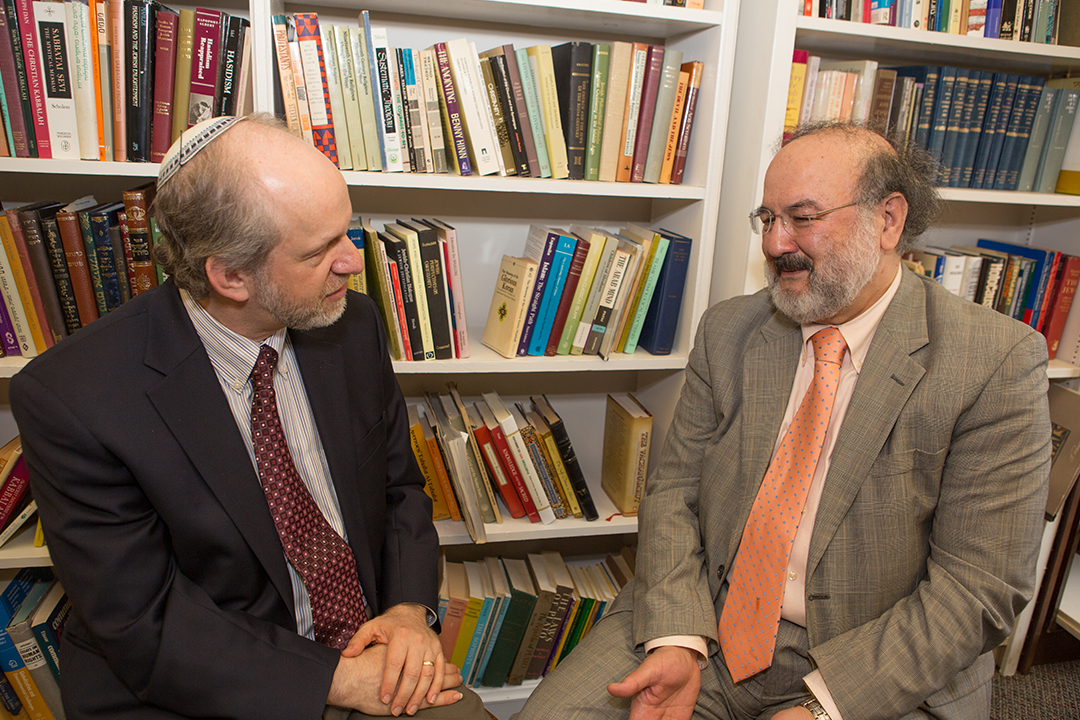Something rather special, even symbolic, happened at GW this year when Religion Department faculty members Robert Eisen, who is Jewish, and Mohammad Faghfoory, a Muslim scholar from Iran—both devout to their respective faiths—collaborated together to create a new master’s degree program in Islamic Studies.
It was an idea that grew out of their friendship and mutual interest in Islam and in interfaith dialogue to promote peace and knowledge.
“It shows what can happen when a Jew and a Muslim get together and talk to each other!” said Eisen, chair of the department. “Personal relationships can overcome divisions of many types.”
Eisen first became interested in Islam while studying the religion’s tradition as a history major at Yale University. When he pursued a PhD in Jewish thought with a specialty in medieval Jewish philosophy, the program included material on Islamic philosophy because of the interconnection between the two religions. In recent years, he has turned his attention to bridging knowledge and understanding among the Abrahamic religions of Islam, Judaism, and Christianity.
The unique collaboration between Eisen and Faghfoory grew out of a gradually evolving friendship that began in 2000. Over time, both engaged in interfaith and international activities focused on observing different cultures and reducing violence, particularly in the Middle East. Their bond is made all the more interesting by the fact that Faghfoory is from Iran, given the tensions that exist between Israel and Iran today.
“Without forgetting who we are, we did not see each other as Muslim and Jew, but as two friends and colleagues who wished to serve the university and the community,” Faghfoory said. “Through our collaboration, we hope to demonstrate to both Jewish and Muslim communities in this country that with good will and trust, there is nothing we cannot do together.”
The program offers an original, insider’s perspective of Islamic tradition as a religion, a civilization, a culture, and a political force. Unlike other Islam programs, it incorporates a historical component when focusing on classical texts or modern Islam.
“We combine both approaches, offering a solid grounding in classical texts with the study of modern politics and international relations in the Islamic world,” explained Eisen. “Students will have the capacity to understand the historical roots behind what’s going on in the Islamic world today.”
The connection between Islamic studies and other disciplines will bring scholars of religion, history, political science, and international relations together. In addition, guest lecturers will include former ambassadors, diplomats, and noted spiritual leaders.
“The Middle East, which receives so much attention, is only a small part of the vast world of Islam,” noted Faghfoory. “The majority of Muslims live outside that region but don’t receive nearly as much attention, which is why we developed this program using a broad prospective on the complexities and historic roots of the Islamic world.”
Among the program’s faculty is an exceptionally distinguished Islamic scholar, Seyyed Hossein Nasr, a University Professor of Islamic Studies; Kelly Pemberton, a scholar of Islamic mysticism and women’s studies; and Irene Oh, whose field of focus is peace studies. “Rarely can you find a program that includes as many internationally renowned scholars as we have,” Faghfoory said.
In the past, the Department of Religion offered a MA in Hinduism and Islam, a topic that is now a track within the new program for students wanting a comparative degree in Islam and Hinduism.


